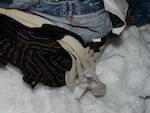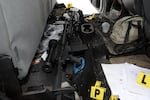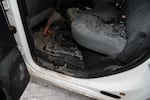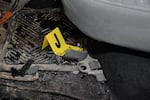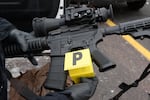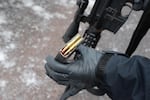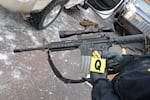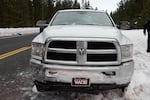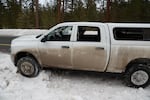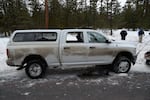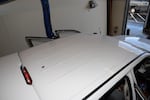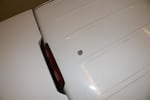An informant tipped off Oregon State Police that Malheur occupation leaders were traveling to John Day, Oregon, on Jan. 26, according to information revealed Wednesday in court.
Authorities used that information to take Ammon Bundy, Ryan Bundy, Shawna Cox and several others into custody after stopping them en route to a community meeting in nearby Grant County on Jan. 26, 2016.
Wednesday’s testimony centered mostly on that day, which drastically altered the occupation’s trajectory.
Ammon Bundy's Driver
Trooper Jeremiah Beckert testified Wednesday at the trial of seven members of the occupation of the Malheur National Wildlife Refuge that a government informant embedded with the occupiers at the refuge — identified as Bundy’s driver, Mark McConnell — tipped off authorities about the planned trip. On the stand Wednesday, Beckert identified McConnell as the informant.
He testified that McConnell told law enforcement the occupation leaders were on the move toward John Day and provided a “threat assessment.”
Members of the occupation and associated patriot groups have previously accused McConnell of being a government informant. McConnell, who has previously been identified as a leader in the III% patriot group in Arizona, was in the car with Ammon Bundy and others at the time of the arrests, but unlike Bundy and the others taken into custody Jan. 26, McConnell was set free.
LaVoy Finicum's Killing
Shortly after the arrests, McConnell began putting out videos on social media encouraging people not to believe reports about what had happened, specifically reports that FBI agents shot Robert "LaVoy" Finicum as he was trying to surrender.
During the roadblock, Finicum was fatally shot by Oregon State Police officers.
In his testimony, Beckert described helping arrest the individuals in McConnell’s Jeep before moving forward to help the officers at the road block where Finicum had driven his truck into a snowbank.
“I saw a white male in a cowboy hat lying on his back,” he testified. Beckert said he later learned the person on the ground was Finicum.
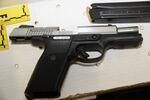
The weapon found in militant leader Robert "LaVoy" Finicum's jacket pocket. The Central Oregon Major Incident Team released photos of evidence from Finicum's Jan. 26 shooting.
Central Oregon Major Incident Team
Also Wednesday, a detective who investigated Finicum’s killing testified to the weapons found at the scene.
Det. Ronald Brown with the Deschutes County Sheriff’s Office said he found two semi-automatic rifles (both registered to Finicum) and a revolver in Finicum’s pickup truck. Investigators also found a 9 mm handgun in Finicum’s coat pocket, according to testimony.
The two rifles and the revolver were presented to the jury in court. A light residue coated the weapons. Law enforcement used what are called OC canisters — similar to pepper spray — during the arrest of Ryan Bundy, Cox and others in Finicum’s truck. Prosecutors pointed to the residue as evidence the guns were present during their encounter with the occupiers.
Beckert testified occupiers Ammon Bundy and Brian Cavalier were not armed at the time of their arrest but added McConnell was carrying a semi-automatic handgun.
The Occupation's Final Days
After Beckert's testimony, defense attorneys spoke to Judge Anna Brown outside the presence of the jury. They argued they should be allowed to ask further questions related to Finicum's shooting and possible misconduct by the FBI. Brown denied that request.
She did clarify it was OK for the defense to bring up how the shooting psychologically affected people who remained at the refuge — a reference to David Fry and Jeff Banta, two of the final four occupiers. Both of those men have alluded to feeling afraid for their safety after Finicum's death.
A certified FBI negotiator named Marc Maxwell testified Wednesday about phone calls made in the occupation’s final days. Jurors heard conversations between negotiators, including Maxwell, and Banta discussing a potential end to the occupation.
Maxwell said he was there to hopefully bring the situation to a peaceful resolution.
The calls shined a light on those tense final days — some striking dark notes while others seemed more hopeful.
Subscribe To 'This Land Is Our Land'
Subscribe to "This Land Is Our Land" on NPR One, Apple Podcasts or wherever you find your podcasts. Find comprehensive trial coverage at OPB.org/ThisLand.
Share your thoughts on the trial with us on Facebook and Twitter, or by emailing us directly at thisland@opb.org.
